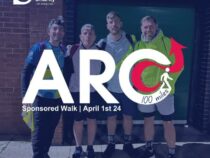Living with dyslexia
This Dyslexia Awareness Week, Dr Chris Bushby has spoken to Norfolk Director Magazine on his experience of living with Dyslexia.
Having been Chief Executive of two leading organisations in the region over 25 years, a Chair of several Boards and with three honorary doctorates, certain assumptions are made of you. But many will have no idea that some days I can find it difficult even to write my signature.
I was fortunate to have been diagnosed as dyslexic when I was eight or nine. I was born at Colchester Hospital and adopted at birth, by a wonderful couple. My father was Professor of Music at the Royal College of Music in London and my mother was in teaching. My parents had a biological son, my brother Peter, who is eight years older than me and also went on to adopt my two sisters.
I attended Bedfield Primary School, which only had two classes. At that time dyslexia wasn’t recognised in the Suffolk education system and I was considered ‘backward’. My parents recognised that there was something more complex about the way I learnt and paid for me to undergo diagnostic testing in London. With a confirmed diagnosis, they also arranged for some appropriate teaching to help.
At senior school I also benefitted from the support of four fantastic teachers who recognised my abilities, Miss Arnold in English particularly. I finished school at Debenham High as Head Prefect, House Captain and Head Librarian, which is ironic as I have hardly ever read a book!
Undeniably there have been barriers. As part of the Duke of Edinburgh Award Scheme I undertook a placement at a veterinary practice in Framlingham. I loved it and ended up working there on Saturdays for the next three years. They thought I had promise to become a vet, but because of the academic qualifications and lack of recognition of dyslexia at that time, it wasn’t a possibility.
Instead I spent three years in the army in the Coldstream Guards. I was privileged to be awarded as top student on graduation which enabled a route into university on my return. By this time there was a greater understanding of dyslexia and when I completed my MBA I was allowed to bring in my personal assistant at the Suffolk Agricultural Association to type my answers.
I am a black belt, 3rd Dan in Judo. This practise and resulting achievements, competing on a national and international stage, helped my personal development and an understanding of what I am capable of. For example, I couldn’t write or read well, I see words as shapes, but I could think and speak. I was the only pupil at the time to have been awarded 20/20 in my oral English exam. My speech was on ferreting and I took in my pet ferret. The external examiner had to hold him while I did my oral exam and didn’t take any notes! Like a lot of dyslexics I have a good memory and I am also good at problem solving and seeing the big picture. This really helps as a CEO and Chair.
Technology has been a game changer. I use dictation software on my phone, spell checking and find models and other visual tools, such as PowerPoint very helpful. I enjoy Radio 4 for keeping up to date with current affairs and news.
As a business leader, it is important to build a team around you with the skills to help you succeed. All work places today should have a culture where everyone has an awareness of learning difficulties and the challenges they may present. Those with learning differences should be fully supported with additional help and assistive technology as required. Simple changes can make a big difference, such as changing communication methods and using audio more frequently. Everyone should be given a chance and I am pleased to say this is certainly the case at Big C. The support given should never be patronising, diversity within teams is extremely beneficial to an organisation and can bring a different dimension to thinking and creativity.
Thankfully today, there is a lot of help available to diagnose dyslexia and support students through the education system and employees in the workplace. A few of these organisations are signposted below. Some also offer support to employers. It’s a good idea to speak to your child’s school, or to your GP in the first instance.
For further support, please contact the following organisations
Latest news
Let’s keep in touch
Subscribe to our mailing list to receive news and updates from Big C.



